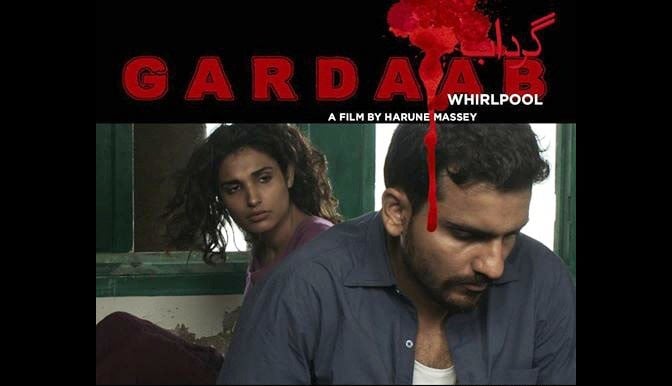
Pakistani film, Gardaab, shown in an ongoing screening at the Pakistan Arts Council of USC Pacific Asia Museum, is an attempt to venture into serious cinema territory

Nobody in Pakistan, it seems, is interested in serious cinema -- tapping the coke-studio-style fusion of Indian-Pakistani movies as the only possible potential. Globally, however, serious cinema is a strong niche. Therefore any addition to the practically non-existent art cinema in the country rekindles the hope of a possibly bright future.
In a climate of celebration of revival of cinema, albeit a mediocre one, anyone attempting a hand at art movie should be commended. Gardaab (whirlpool) is just that, an attempt in the right direction.
Claimed to have been made with a meagre budget and even a meagre amount of time, the film could have used both to its advantage.
Where does one even start the review? Maybe the plot. The film tackles too much in too little space. The story is loosely based on Romeo and Juliet and the setting is the slums of Karachi engulfed in violence and crime. Three friends crash a neighbouring gang’s private party as a clandestine operation to see Russian prostitutes. With no luck in that area, our boy (Shahbaz) meets a girl (Parveen) who is no ordinary maiden, she is the daughter of one of the gang leaders. The protagonist has a story of his own. As a child soldier, he murdered his lover’s family member but now keeps a low profile working as a mechanic in an auto workshop.
Love and hate are nurtured with equal passion and as the story progresses, the two lovers come to a realisation of their doomed relationship marred by the history and politics of their own clans.
Originally planned as a short film, Gardaab has multiple layers in terms of themes -- communal violence, criminal gangs, social exploitation, minority issues, child soldiers, drugs and arms. It is set in a city that lives and dies each day, and with it probably hundreds of Shahbazs and Parveens. Fawad Khan (no, not him) is a theatre actor who leaves a strong enough impact amid seasoned actors like Khalid Ahmad, Sana Askari and the talented Nimra Bucha. Amna Ilyas (model and actor), is a decent rebel-behind-chadar only if the focus was less on being cute. Zohar Rasheed, a strong performer, has been largely sidelined while Adnan Shah’s one-model-fits-all acting is borderline tedious. Acting, nonetheless, remains the film’s strength.
Director and writer, Harune Massey’s candid acknowledgment of lack of funds and time for his film could come across as an excuse for the many flaws. Gardaab is painfully missing an identity; almost everything in it sounds familiar, even some of the lines. (For the most recent example of a brilliant Shakespearean adaptation see Haider). One cannot help but point out that the cinematography too could have been better than it is.
Having said that, the spark is there for sure. At the end, it does seem like a cross between commercial and serious cinema.
Pakistan is a goldmine in terms of issues for serious cinema; and although it leaves much to be desired, Gardaab endeavours to touch the right chords. It is an attempt to locate humanity at the core of a heartless city and for that it deserves credit.